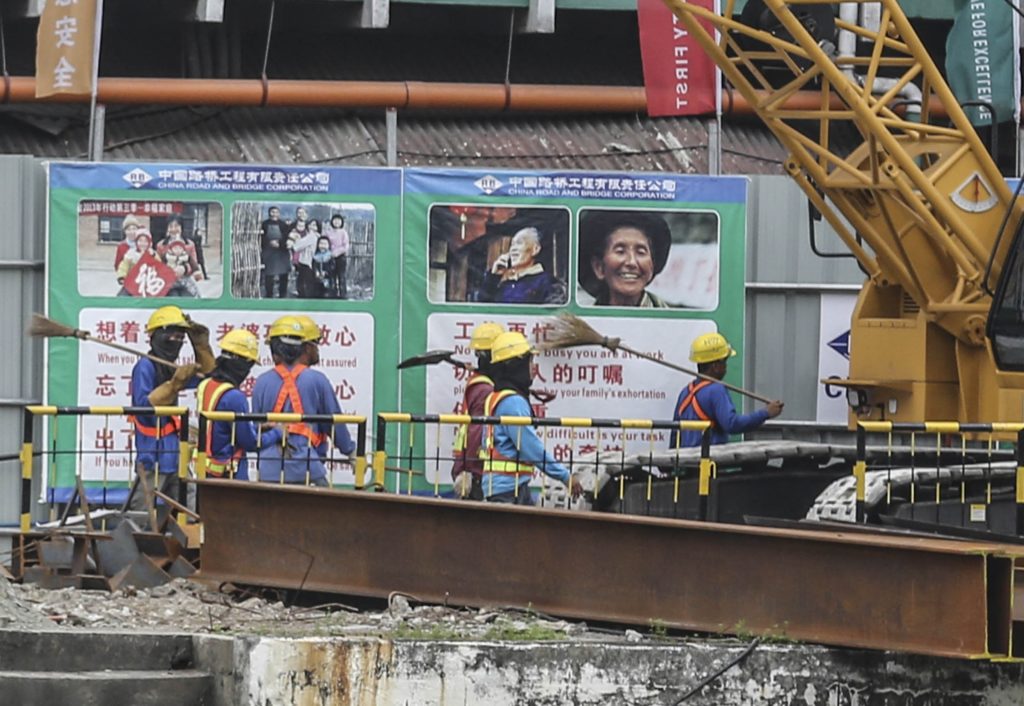Pag-empleyo ng Chinese workers sa dalawang proyektong tulay sa Maynila, tinawag na ‘imoral’, ‘ilegal’

Ang mga Chinese workers habang nagtatrabaho sa China-funded Binondo-Intramuros Bridge sa Maynila. (Joan Bondoc/Inquirer)
Tinawag na “imoral” at “ilegal” ng isang advocacy group at think-tank ang pag-empleyo ng mga Chinese workers sa dalawang bridge projects sa Maynila.
Sa kanilang sulat kay Mayor Isko Moreno, sinabi ng Pinoy Aksyon for Governance and the Environment (Pinoy Aksyon) na ito ay “pagyurak sa interes ng mga Pilipino.”
“Pinoy Aksyon would like to bring up with you what we thought is immoral and illegal practice of hiring foreign nationals in some public works projects depriving Filipino workers of jobs,” ayon kay BenCyrus Ellorin, chairperson ng grupo.
Sa Senate hearing para sa budget ng Department of Public Works and Highways nitong nakaraang Miyerkules, inamin ni Undersecretary for Public Works Emil Sadain na may mga manggagawang Chinese na nagtatrabaho sa Estrella-Pantaleon bridge at sa Binondo-Intramuros bridge projects.
Sa Binondo-Intramuros Bridge project, 45 porsyento ng lakas paggawa ay Chinese at 31 porsyento naman sa Estrella-Pantaleon Bridge, ayon kay Sadain.
“We would like to enjoin you take decisive action on this blatant trampling of Filipino interests right in your beloved city, like what you did in the issue of a beauty product which was labelled as made in Binondo, Province of China. We are, by the way, extremely grateful for your patriotic act,” wika pa ni Ellorin.
Tinutukoy ni Ellorin ang ginawang pagpapasara ni Moreno noong Agosto sa isang product distributor sa Binondo na nagbebenta ng mga produktong may label na “Made in Manila, province of China.”
“Equally alarming are reports reaching us that ‘forced labor’ is being employed by Chinese companies with projects here in the Philippines. Allegedly, prisoners are sent here for involuntary labor,” wika pa ni Ellorin.
“If true, and left unchecked this could make the country complicit to this blatant violation of human rights laws and International Labor Organization conventions,” dagdag niya.
Inaasahan na ang “Build Build Build” project ng administrasyon ay magbibigay ng trabaho sa mga Pilipino.
Pero sa datos kamakailan, tumaas ng 10 porsyento ang kawalan ng trabaho, mula 5.4 porsyento noong Huly 2019 ay naging 17.7 porsyento nitong nakaraang Hulyo. Maging sa sarbey ng Social Weather Station, umaabot sa pitong milyong Pilipino ang nagsabing nakakaranas sila ng gutom.
Kaya sinabi ni Ellorin na mahalagang patatagin ang ekonomiya ng bansa para lumikha ng trabaho na magreresulta ng mga pang-ekonomiyang aktibidad sa kalakhan ng mahihirap na Pilipino.
“We know you are very concerned with this dire situation and would support any moves to spur economic activity and create jobs,” wika niya.
“The build build build program of the Duterte administration is one of the major job generators. There is however a sore finger in terms of employment generated by the build build build program,” dagdag ni Ellorin.
Sinabi rin niya na ang mga Chinese ay nagtatrabao bilang karaniwang laborer, hindi sa mga specialized technical work, na aniya ay paglabag sa batas ng bansa.
“We are confident you will take the cudgels of the poor Filipino workers,” wika pa ni Ellorin sa sulat nya kay Moreno.
Disclaimer: The comments uploaded on this site do not necessarily represent or reflect the views of management and owner of Bandera. We reserve the right to exclude comments that we deem to be inconsistent with our editorial standards.


